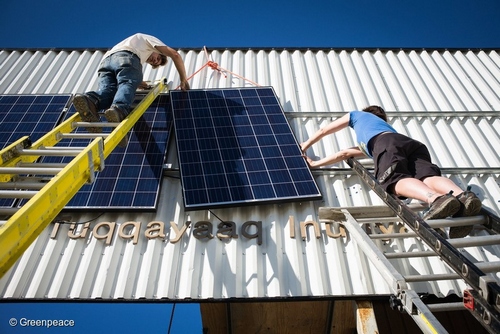EU Parliament backs people-powered renewables but aims too low
Energy committee plan would undo Spain’s controversial ‘sun tax’
The European Parliament’s energy committee voted to recognise the right of Europeans to produce and sell their own renewable electricity, on November 28.

The committee approved amendments to the EU’s renewable energy rules that would make self-consumed electricity free from punitive charges, levies and taxes. This would make Spain’s controversial ‘sun tax’ illegal under EU rules. The ‘sun tax’ forces Spanish solar panel owners to pay for the electricity they produce and consume themselves.
Greenpeace EU energy policy adviser Sebastian Mang said: “The Parliament recognises that every European should have the right to produce, consume and sell renewable energy, but it’s unrealistically pessimistic when it comes to the EU’s renewables target. Just like nobody would force Messi to play in the Belgian third division, playing European citizens at the front of the energy transition only makes sense if they can reach their full potential.”
The energy committee also said 35 per cent of the EU’s energy should come from renewables by 2030. In 2014, European governments suggested a target of 27 per cent and, in 2016, the European Commission supported this target. But the committee supported a loophole that would allow EU countries a ten per cent leeway on the proposed 35 per cent target. This could lower the mandatory share of renewables in 2030 to only 31.5 per cent.
The committee also failed to support binding renewables targets for each EU country. With no binding national targets after 2020, the EU could find it harder to hold governments accountable for insufficient contributions to the overall EU target.
Potential of people-powered renewables
A report by CE Delft released by Greenpeace last year shows that, with the right support, half of all EU citizens could produce their own electricity by 2050, meeting nearly half of the EU’s electricity demand. Power companies would provide the remainder of Europe’s renewable electricity.
To limit global temperature increase to 1.5 degrees, as agreed at the Paris climate conference in 2015, the EU must increase its renewable energy target to at least 45 per cent by 2030, and transition to a system entirely powered by renewables within a generation, warned Greenpeace.
Source: Greenpeace European Unit
- 334 reads
Human Rights
Fostering a More Humane World: The 28th Eurasian Economic Summi

Conscience, Hope, and Action: Keys to Global Peace and Sustainability

Ringing FOWPAL’s Peace Bell for the World:Nobel Peace Prize Laureates’ Visions and Actions

Protecting the World’s Cultural Diversity for a Sustainable Future

Puppet Show I International Friendship Day 2020

